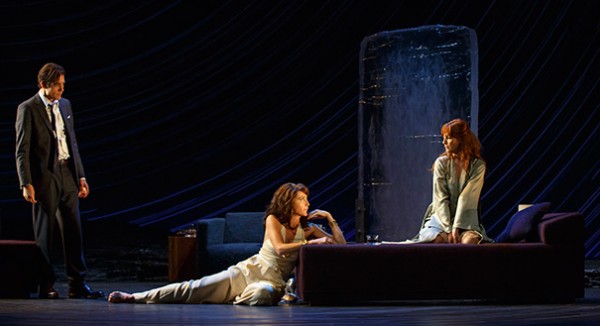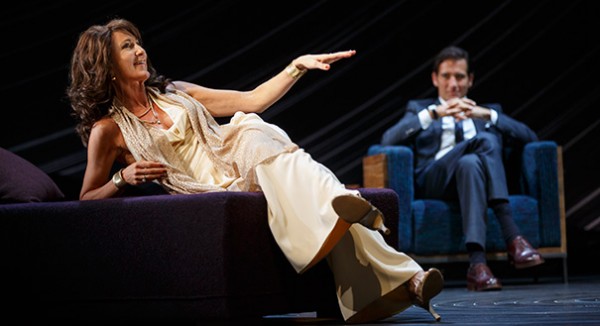
Clive Own, Eve Best, and Kelly Reilly delve into the mysterious past in Roundabout revival of Harold Pinter’s OLD TIMES (photo by Joan Marcus)
American Airlines Theatre
227 West 42nd St. between Broadway & Eighth Ave.
Tuesday – Sunday through November 29, $67-$137
212-719-1300
www.roundabouttheatre.org
As the Roundabout’s Broadway revival of Harold Pinter’s Old Times opens, Deeley (Clive Owen) is man-spread on a fashionably modern chair, Kate (Kelly Reilly) lies on a matching couch, and Anna (Eve Best) stands between them, facing a large, rectangular block of ice, her back to the audience at the American Airlines Theatre. It looks as if something happened the night before, something no one wants to remember. “Dark,” Kate says to Deeley. Indeed, Old Times is dark. And this being Pinter, don’t expect there to be much light shed on exactly what might have happened the night before, or at all, during this seventy-minute journey into a never-defined past or present. Early on, Kate confesses to Deeley, her husband, that Anna was her best and only friend, that they once lived together, but she also admits, “I hardly remember her. I’ve almost forgotten her.” Meanwhile, Anna raves about the two women’s relationship in great detail, with verve and excitement, but she adds, “There are some things one remembers even though they may never have happened. There are things I remember which may never have happened but as I recall them so they take place.” They all discuss having seen Carol Reed’s IRA noir masterpiece, Odd Man Out, and at one time or another in the play, each of the characters becomes the “odd man out” as the other two bond by telling old stories, singing American classics, or debating a possible previous meeting. “Some people throw a stone into a river to see if the water’s too cold for jumping,” Anna says, continuing, “others, a few others, will always wait for the ripples before they will jump.” There are plenty of ripples in Old Times, which has a backdrop of ever-widening concentric circles that evoke the ripples in a lake, or the rays of a pitiless sun. Christine Jones’s (American Idiot, The Green Bird) set also features black clumps of dried lava (“I live on a volcanic island,” Anna says), a sharp counterpoint to the huge block of ice and the mural of rippling water or blazing sun, echoing the characters’ ability to go from hot to cold and back again in an instant.
It’s been forty-four years since Old Times was last seen on Broadway, in its Great White Way debut with Robert Shaw, Rosemary Harris, and Mary Ure, and the Roundabout previously revived it in 1984 with Anthony Hopkins, Jane Alexander, and Marsha Mason. It is considered one of Pinter’s middle-period memory plays, which also include 1974’s No Man’s Land and 1978’s Betrayal, each of which has been revived on Broadway the last two years, the former a huge hit, the latter a major disappointment. Douglas Hodge, who has appeared in and directed many of Pinter’s works over the past two decades, makes his Broadway directorial debut here with a sure hand, keeping things appropriately mystifying, obscure, and utterly compelling, although the strobe lights and the onetime rotation of the stage seem unnecessary. Owen (A Day in the Death of Joe Egg, Closer) and Reilly (After Miss Julie, Russian Dolls) make strong impressions in their Broadway bows, he giving Deeley more than a little smarm, she imbuing Kate with an uncomforting yet sublime mystery, but Best, who was nominated for a Tony in 2008 for her performance as Ruth in Pinter’s The Homecoming, is an absolute whirlwind, dominating the stage in her gorgeous, sexy white pantsuit, making confident declarations with a commanding physicality. She mesmerizes even with a casual swipe of the floor with her bare foot. There are various theories exploring what Old Times is really about; perhaps Kate and Anna are two parts of the same person, or maybe one of the women has killed the other, or maybe they’re all dead, lingering in a kind of way station. Pinter never said, so we’ll never be sure. But we do know that there may be no one better at evoking the prismatic nature of time and memory and the brilliant refractions of human relationships than the iconoclastic British playwright.
